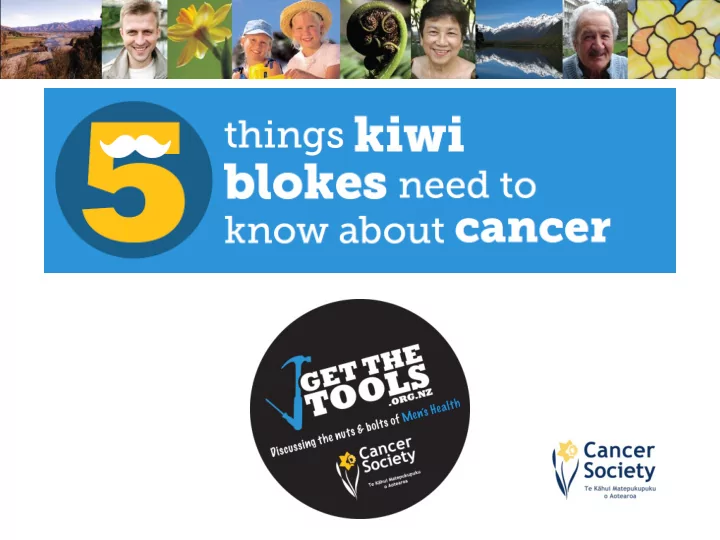

Men’s Health
Who we are • We are a not for profit organisation funded by caring New Zealanders. • We receive no Government funding. • Improving well-being by reducing the incidence and impact of cancer.
Cancer Society Canterbury • Support – help alleviate both physical and emotional aspects of cancer. • Advocacy – represent and be an advocate for the needs of people affected by cancer. • Health Promotion – work with the community to promote healthy lifestyle options. • Research – funding support for cancer research.
Why stop smoking? Causes problems for - Hearing - Brain - Skin - Heart - Back - Stomach & bowel - Penis - Muscles and bones
Limit your alcohol intake
Healthy Eating and Physical Activity • Healthy eating, regular physical activity and keeping a healthy weight can lower your cancer risk • High risk for bowel, breast, kidney, pancreas, oesophagus, endometrium and gall bladder cancer • Waist measurement of less than 94cm for men
What type of food should I be eating?
Exercise more, avoid the convenience
Bowel Cancer Blood in your poo Looser or runnier poo (diarrhoea) Pooing more often or a change in when you normally poo Swelling, pain or an unexplained lump in the tummy Tiredness or looking pale Unexplained weight loss Loss of appetite
National screening • Not happening yet • Symptoms or Family history – be in touch with your GP • No family history, no symptoms and over 50 can try a bowel cancer testing kit • 75% of bowel cancer cases can be cured if caught in time
• There are 3 common types: Skin Cancer – Basal cell carcinoma – Squamous cell carcinoma – Melanoma
Why the concern about sunburn? Skin cancer is the most common cancer in New Zealand. Skin cancer is caused by too much UVR exposure. Over 90% of skin cancers are potentially preventable.
Ultraviolet radiation (UVR) UVR – you cannot see or feel it (the heat from the sun is infrared radiation not UVR). Because UVR levels are not related to temperature you cannot use temperature as a guide to whether you’re likely to get sunburn. Some sun is essential for Vitamin D, but deficiency of vitamin D is less of a concern than cancer is.
What’s special about NZ? NZ has among the highest rates of skin cancer in the world • High levels of UVR in summer • Unpolluted atmosphere • Many fair-skinned people • Temperate climate • Outdoor lifestyle
Sun protection is essential September - April 10am - 4pm This is when UVR levels are highest and you should protect yourself from the sun when outdoors.
People Most at Risk... • Have red or fair hair • Skin that burns easily • Have lots of freckles or moles • Outdoor workers or those who spend more time outside • Family or personal history of skin cancer
Early detection Know your own skin. Get someone else to check the areas you can’t see. Skin cancer is easy to treat if caught early.
It’s a good idea to check your skin regularly (every 3 months) If you notice any change in; – Size – Colour – Shape – Texture – differences in height – Sensation – itching – Surface – scaly, ulcerated or bleeding see your doctor immediately!
How to prevent • Slip into some shade • Slip on sun-protective clothing • Slap on a hat • Slop on some sunscreen - on all exposed skin
Symptoms and Diagnosis - No symptoms - Difficulty passing urine - Urinating more frequently, often at night - Pain - Blood in urine
Risks • Aged 40-75 • Father or brother diagnosed • Ethnicity – African American or Caribbean • Overweight
The Check up
Testicular Cancer • Most common cancer for men 15-39 yr • All ages can get it • Good chance of curing testicular cancer is found early
Symptoms • A lump in either testicle; the lump typically is pea-sized, but sometimes it might be as big as a marble or even an egg. • Any enlargement of a testicle • A significant shrinking of a testicle • A change in the consistency of a testicle (hardness) • A feeling of heaviness in the scrotum • A dull ache in the lower abdomen or in the groin • A sudden collection of fluid in the scrotum • Pain or discomfort in a testicle or in the scrotum • Enlargement or tenderness of the breasts See the doctor immediately
Recommend
More recommend